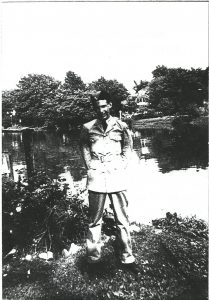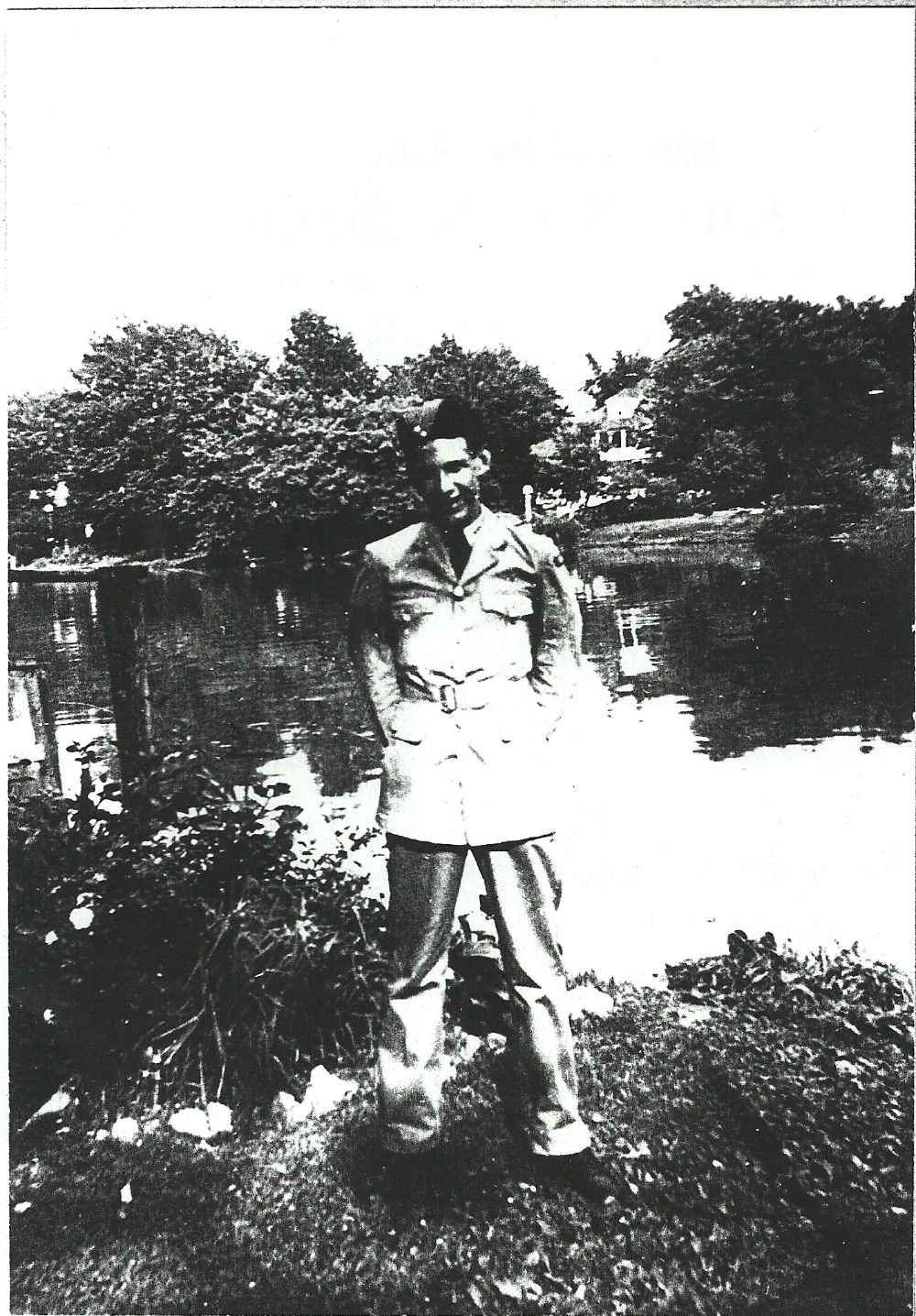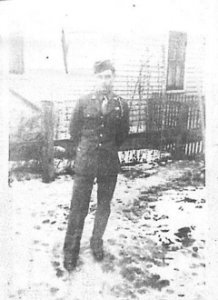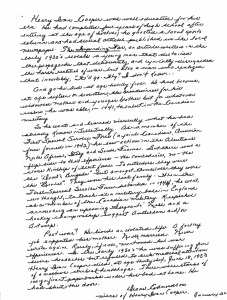
| Rank | Private, Corporal, Acting Sergeant, Sergeant |
| Service # | A55915 |
| Unit # | R.C.O.C., RCR, 1st Special Service Force |
| Resident | 134 West St., Chatham |


Born 23/12/1916 at Tilbury East Twsp. (Fletcher), Kent Co., ON., the son of Peter Charles “Bertie” and Mary Cameron Grant Cooper. Next of kin reported as Mrs. Mary Cooper of 134 West St., Chatham, ON. Henry never married nor have any known children.
According to family information provided “Buster” enlisted 13/12/1941 at Windsor, ON. He did his Basic Training between 10 January and March 1942 when he volunteered for the First Special Service Force and qualified for parachutist, skiing, mountain warfare, amphibious landings, demolitions, special recce, track vehicles, M1 rifle pistols, Thompson sub-machine gun, Browning LMG [Light Machine Gun], anti-tank rocket launcher, rifle grenade, flame-thrower, chemical warfare and radio operator. Training for 1st S.S.F. was as intense as Commando, Special Air Service and US Rangers and then some.
He served in the Asiatic Pacific Theatre [Kiska] 1943, Mediterranean Theatre – September 1943, Southern Italy 1944, the Anzio beachhead, and finally in Southern France in 1944 when 1st S.S.F. was disbanded. According to the CDN 17/02/44 ‘Buster’ was wounded in Action. The last stamp in his Soldier’s Pay Book was “11 Sept. 1945” likely his discharge from the army.
Henry Ivan “Buster” COOPER.
A55915
By
Diane Edmonston (Niece of “Buster Cooper)
“Henry Ivan Cooper was well educated for his era. He had completed four years of high school after entering at the age of twelve; he ghosted [a person who writes for and gives credit of authorship to another person] a local sports column and had several articles published in the local newspapers. The Impending War, an article written in the early 1930’s reveals a young man that distained the propaganda that deliberately and cynically disregarded he harsh realities of war but also a man who realized the inevitability, “We ‘ll go. Why? I don’t know….
And go he did at the age of twenty-five. He had become, at age sixteen or seventeen, the breadwinner for his widowed mother and younger brother but for wherever reason, he was able, in 1941, to enlist in the Canadian military.
So he went and learned visually what he had already known intellectually. As a member of the First Special Service Force (a joint Canadian / American force formed in 1942) he saw action in the Aleutians, North Africa, Italy and South France. But there was a flipside to that experience – the camaraderie, no the close kinship of that force. To outsider they were the “Devil’s Brigade” but amongst themselves they were the “Braves”. They were his real family. When the First Special Service Force disbanded in 1944, he went we thought to teach at a military base in England as a member of the Canadian military. Keepsakes announcing an upcoming Sergeant’s Mess and a hockey championship suggest Amsterdam and / or Antwerp.
Post war? He lived an isolated life. A factory job supported his mother. Never married. Never wrote again. Rarely, if ever, mentioned his war experiences. In the early 1950’s he was suffering from severe headaches but refused to seek medical attention. Henry Ivan Cooper died, at age thirty-six, June 18, 1953 of a massive cerebral hemorrhage. There were stacks of insignificant paperbacks under his bed at home. He had shut the door.
Diane Edmonson.
Niece of Henry Ivan Cooper – January 2012.
He was Serving with the RCOC when it was reported, returning from overseas on board the S. S. “New Amsterdam” part of a contingent of RCR members. CDN 25/09/45 also IODE(N), CCI-RH, family information D. Edmondson.
Discharged according to the stamp in his Soldiers Pay Book 11/09/45.
A copy of the article “The Impending War “ written in the 1930 [date unknown] by Harry Cooper was found in the Kent Regt. Chapter IODE – “Chatham Kent Enlistments WWII” as follows: –
A little over twenty years ago, Canada went to war. She did her part, and did it well. Now, on every Armistice Day we, the Canadian people buy imitation poppies and feel very proud of our Soldiers Dead. Then we properly forget them.
Some say they are not forgotten; they live in our memories, in our monuments, even in the pensions paid to their families. Yet they are forgotten. We remember only a uniform that marched to the beat of a war drum. Somewhere, there is unvoiced agony still for the death of a loved one; but that is not the Canadian people as a whole.
We are told they died that we might live. Yet, why should our lives be saved from disgrace for a while, if we in turn are to die for the peace of mind of the next generation? They were told it was glorious; it was sweet to die for one’s country. They saw a slaughterhouse in action for four years, with the cattle only buried, sometimes never buried, but left to rot until the friendly earth should take them.
“Honour is more precious that life. “Would the thoughts of one of those men laying on the grave-set Flanders plain, his body ripped open, living yet, but dying in a screaming welter of red agony worse than mothers-pain gave him life, have gotten through the carefully censored news channels of London! Would he have murmured, “I die that England might live?”
There will be another war.
We’ll say, we don’t want war, will keep out of it. Then will come insidiously worded propaganda. We’ll begin to wonder if we’re right. The wicked must not inherit the Earth. A demagogue will take up the shout. The clergy will cry out against the wicked enemy. A drum will beat. Feet that danced to music can march to it. A noncombatant is a slacker. Let’s go to war!
We’ll go.
Why?
I don’t know, but neither did they.
Henry Ivan Cooper
Henry passed away in June of 1953 at the age of 36 years old. CDN 19 & 20/06/195



ADDITIONAL INFORMATION
| Sources | NB(P), IODE(N), CCI-RH, family information D. Edmondson, NB(P) |
| Birthplace | Fletcher, Ontario |
| When Enlisted | December 13th, 1941 |
| Next of Kin | Mother- Mrs. Mary Cooper |
Notice something wrong with this record? Or, do you have something to add? Report it using our online form.


